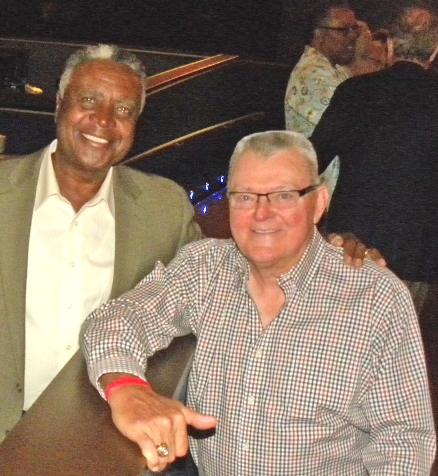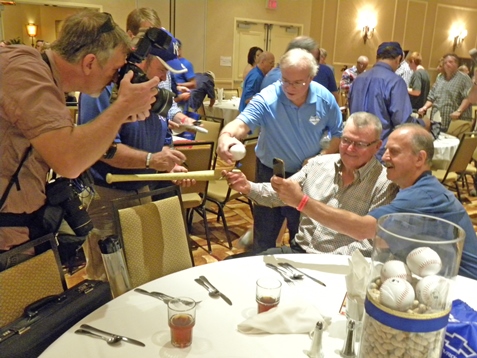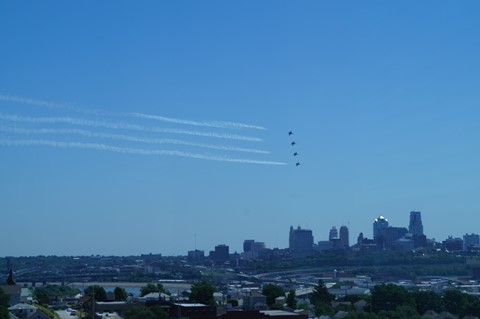
by Alan Hoskins
It was a night of de ja vu. For three hours fans mingled with the stars of Kansas City’s only world championship baseball teams, getting autographs, posing for photos and selfies and listening to the memories of that magical season of 1985.
Thanks to the Kansas City Baseball Historical Society (KCBHS) under the leadership of Mark Moore and Jim Jay, upwards of 500 Royals’ fans broke bread and enjoyed an evening of nostalgia at Harrah’s with 15 of the world champs including four who shared memorable moments with the fans – pitcher Charlie Liebrandt, catcher Jim Sundberg, infielder Buddy Biancalana and outfielder Pat Sheridan.
The Royals returnees also included Hall of Famers Frank White, Dennis Leonard, Willie Wilson, Hal McRae and Brett Saberhagen along with pitchers Danny Jackson, Steve Farr and Mike Jones, infielder Greg Pryor and outfielders Darryl Motley and Lynn Jones; Mrs. Dick Howser and Mrs. Dan Quisenberry; trainer Mickey Cobb and groundskeeper George Toma.
Much of the attention, however, was directed towards a special guest, umpire Don Denkinger whose controversial safe call on Jorge Orta to start the ninth inning of the Royals’ come-from-behind 3-2 win over the St. Louis Cardinals in the sixth game of the World Series is to do this day many St. Louis fans believe was the reason the Cardinals lost the Series.
The Royals, however, were having no part of it.
“They forget Jack Clark missed a foul pop-up near first base; that Bones (Steve Balboni) singled on an 0-2 pitch; and that Darrell Porter missed a pitch that should have been caught that put runners on second and third before Dane Iorg’s huge hit,” Leibrandt said.
“Don Denkinger took the pressure off Jack Clark because everyone remembers the call at first base and not Clark’s miss,” Sheridan agreed.
A day later, Denkinger was behind home plate when the Royals exploded for an 11-0 win during which Cardinals’ pitcher Joaquin Andujar imploded and he and manager Whitey Herzog were ejected during heated arguments. Asked if during the argument he told Herzog that the reason the Cardinals were losing was they were hitting .120 as a team, Denkinger replied: “Yes I did,” which drew one of the loudest of many rounds of applause. (For the record, the Cardinals hit .185 with just 37 hits in seven games).
That the Royals would prevail in 1985 was actually predicted during mid-season by Jorge Orta. Imitating Orta, Sundberg said: “I was shaving and Jorge came to me and said, Jimmie, this team is going to win this thing; I tell you this team is going to win.”
It was Sundberg who scored the winning run in game six, a play he is often asked to recount. “I was on second base and I expected Dick (Howser) to pinch run for me. I had pretty good speed early but I was in my 13th season and suddenly realized he wasn’t going to run for me. So I started thinking of what I needed to do, get a good lead, get a quick read to see if the ball is going to be caught or not and cut short at third. I knew on impact that Dane Iorg’s hit was going to drop and Darrell Porter made a mistake by coming out to the front of the plate for the throw which allowed me to slide into the backside of home plate.
“Game 7,” added Sundberg, “was the most nervous I’ve ever been. That morning I kind of had a feeling it might be a blow out but I didn’t know who would win. But after the first inning, I told Dick (Howser) all we needed was to score one run because I had never seen Bret (Saberhagen) throw so good. He was so determined and focused. Then Darryl (Motley) almost hit a home run and then did. When I was in the third grade I dreamed of playing in the World Series and leading 11-0 in the fifth inning, the last four innings were the most fun I ever had.”
The key to winning the world championship was the pitching staff, Sundberg said.
“It was the greatest staff I ever caught and we had something that you’ll never see again, it was intact all year” he said. “Sabes (Saberhagen) had the best fast ball I ever caught and I caught eight Hall of Famers. The ball just kind of jumped. DJ (Danny Jackson) had the hardest fast ball to catch. Maybe it was because he was left-handed but you didn’t know if it was going right or left. Charlie (Leibrandt) had that great control and a great competitor.”
Much of the success of 1985 was also directed to Hal McRae, who is just now recovering from a three-year battle with kidney problems.
“He taught us how to play,” Biancalana said. “I had no problem with guys sliding into me at second base because I knew that’s the way we played.”
He got no argument from Leibrandt. “Mac was our leader.”




